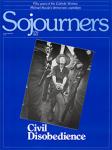I came into the pastorate of the Arvada Mennonite Church near Denver, Colorado, in 1965, having served previously as pastor in Fresno, California, and interim pastor with the Woodlawn Mennonite Church in Chicago's black South Side community. In Chicago I began to learn about the tension between the principalities and powers - the would-be lords of the world - and the principles and powers of the Word of the Lord.
Walking with black brothers and sisters of faith into the streets of Chicago helped remove some scales from my eyes. It freed me to see my pulpit and my people beyond ecclesiastical structures, to see my identity beyond the typical clergy functions of counseling, teaching, preaching, as well as laughing, crying, and celebrating with people - all of which I appreciate as cherished pastoral opportunities.
I took my first small step into civil disobedience in the late '60s, when my soul was troubled about paying taxes for war while preaching the gospel of peace: My wife, Marjorie, and I agreed to withhold half our income tax. We shared our decision with the congregation. The following year, after much discussion, the congregation decided to withhold payment of the federal telephone tax on the church phone. Both of these actions, while small in themselves, became significant opportunities for personal and corporate theological reflection on basic questions of faith and faithfulness.
In the '70s, people in the Denver area became more aware of the Rocky Flats nuclear weapons plant just 10 miles from Arvada. Here all the plutonium triggers for the U.S. nuclear arsenal are produced. We asked ourselves what the response of people of faith should be to this idolatry that blatantly invites the worship of our silent consent. What is pastoral responsibility in such a context?
In 1978, after years of participating with many others in varied forms of witness, I joined a group of some 35 persons in a blockade of the railroad access into the plant. Since then numerous persons and groups have witnessed there and have occasionally held nonviolent civil disobedience actions. A group continues to gather every Sunday afternoon for prayer at the Rocky Flats west gate.
Participation in civil disobedience must be rooted theologically, spiritually, and biblically. For me the center of such rootage is the grace of God in Jesus Christ. On this foundation, civil disobedience comes from much prayer and reflection. It is not carried about with every wind that comes along. It is more than "social activism"; it is a proclamation of the gospel.
Those contemplating civil disobedience should share their sense of call with a congregation prior to the action, remaining open to discernment and discussion of questions and concerns. It is also important to place civil disobedience in the context of the totality and variety of Christian witness and service ministries of the congregation. In the Christian community, civil disobedience must be understood as one among many other essential responses of the community of faith in its particular time and place. The temptation to see civil disobedience as a special or higher calling needs to be faced.
Participation of a member or pastor in civil disobedience may have various effects on a congregation. There may be some troubling of the waters, with some potential for both storms and healing. This may call for increased pastoral care and nurture within the congregation, including dealing with conflict.
Such participation may provide good opportunities for learning, teaching, and evangelism. There will likely be a deepening of worship experiences, with a sharpening of the call to worship the God of our Lord Jesus Christ and a demythologizing of the idolatrous claims of the principalities and powers. At such times, we have experienced a deepening of the prayer life of the congregation.
The members and pastors of a congregation must answer the question of how much risk to take. Our society tends to discourage risk-taking and promote security. The gospel, on the other hand, invites the risk: losing one's life for the sake of Christ, and therein finding life. I believe that in the present time the Spirit is calling people of faith to encourage and support each other in taking more risks for the sake of the kingdom of God. To shrink from doing so ultimately involves the greater risk of spiritual death and cosmic holocaust.
Finally, the question behind all questions related to civil disobedience is the question of faith. We are in a crisis of faith. Will we trust in, or give silent assent to, the sword-bearing, bomb-building god of Mars, or is our trust in the cross-bearing, people-loving God of Jesus Christ? If we believe that Christ is indeed Lord of lords, then civil disobedience is an ever-present possibility for us all. More than that, in the present context, it is an urgent call for all who have ears to hear.
Peter Ediger was pastor of Arvada Mennonite Church in Arvada, Colorado when this article appeared.

Got something to say about what you're reading? We value your feedback!
